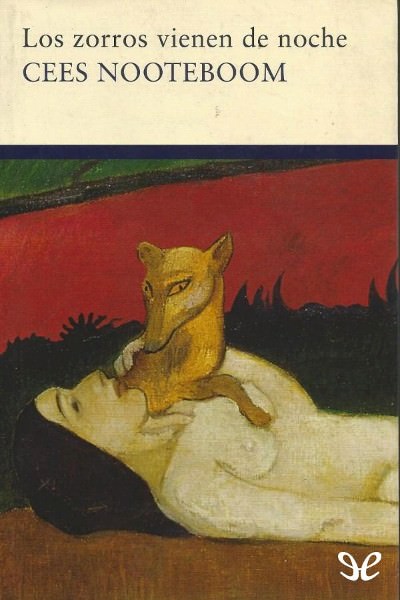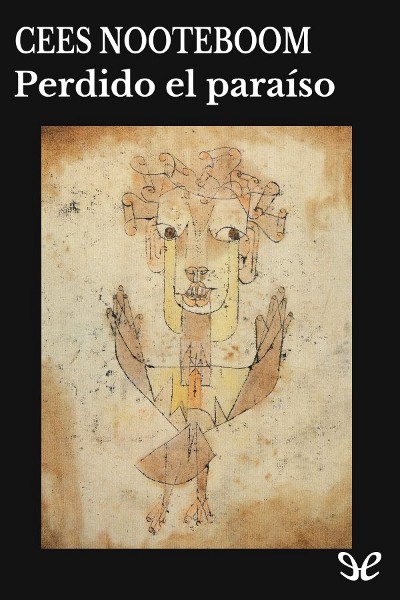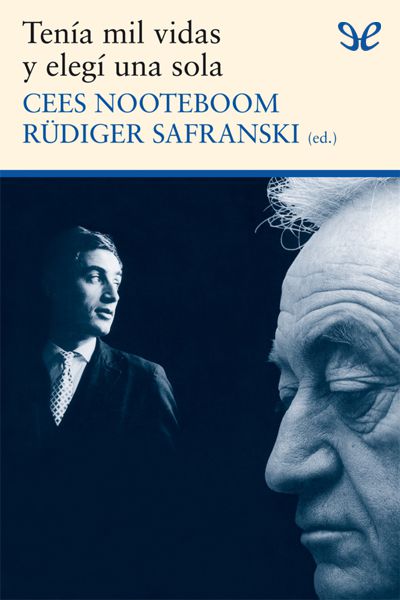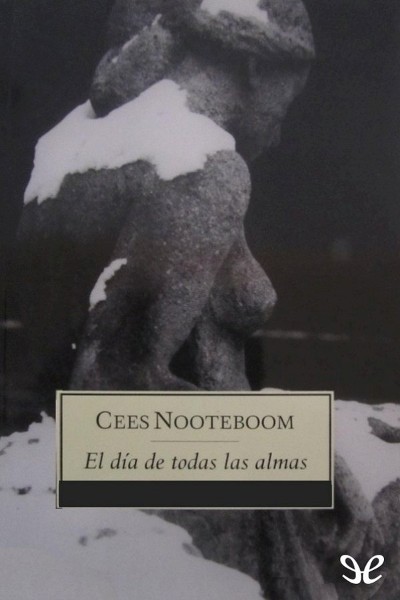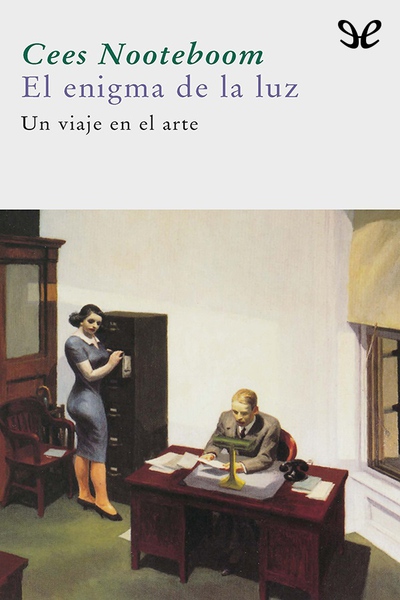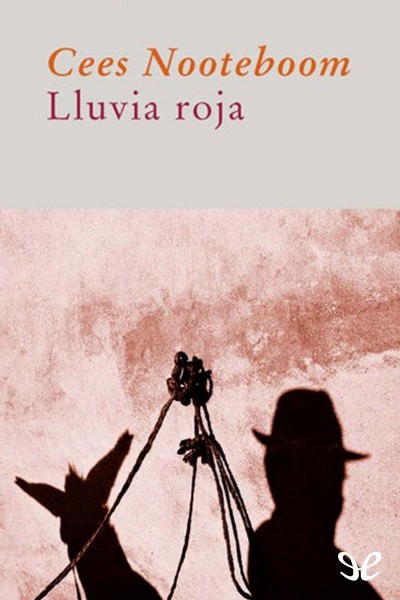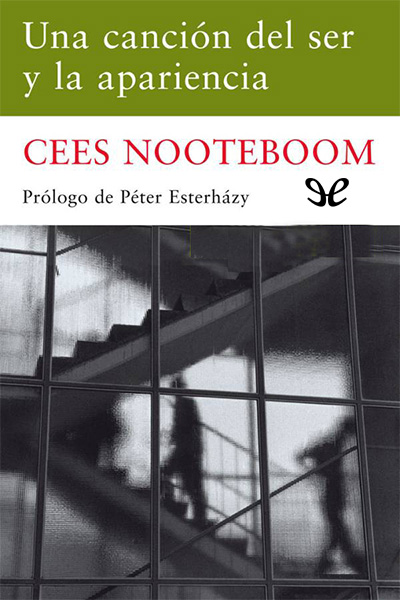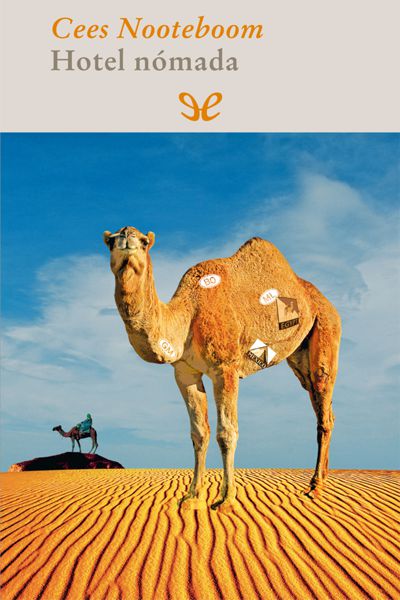oleebook.com
Il giorno dei morti de Cees Nooteboom
de Cees Nooteboom - G├ęnero: Italian
Sinopsis
Arthur Daane, un operatore cinematografico olandese, si aggira per una Berlino irriconoscibile. In fuga da un trascorso individuale di dolore e di sradicamento, Arthur Daane intreccia un intenso dialogo con se stesso e con gli amici interrogandosi sul senso delle cose, sulla costruzione della memoria, sulla partecipazione emotiva alla storia. E, intanto, colleziona con la sua cinepresa immagini, cercando di fissare sguardi inattesi e non banali sulle cose, sguardi da montare un giorno in un film che rimane, per il momento, un progetto tanto indefinito quanto improbabile.
Libros Recomendados - Relacionados
Rese├▒as Varias sobre este libro
Arthur is a citizen of the globe, he has some close friends but he is lonely. And he is obsessed with history.
What he found so fascinating about the idea of history was that it was based on a chemical compound of fate, chance, and design. The combination of these three elements produced a chain of events that produced another chain of events, which were said to be inevitable, or random, or to happen according to a secret plan that was not yet known to us, though by now things were getting pretty esoteric.
Ulysses he travels all over the world and everywhere he goes he takes his camera along and films the present to make it available to the others when it will become the past┬ů
Odysseus had been cunning, but not free. Or about as free as he himself was. Our crafty hero had needed to be rescued countless times by Athena, who had come to him in a variety of guises. There she was again ┬ľ the goddess. But could she still work her magic?
┬ůHe looked up at the statue of Athena, but her eyes looked right past him. Gods never saw you unless they wanted to. Odysseus had been lucky ┬ľ someone had pointed him in the right direction. She could have come up with a simpler solution, but it wouldn┬ĺt have made as good a story. He filmed a scene he┬ĺd filmed before, a long sweep beginning with Potsdamer Platz, moving slowly over to the Brandenburg Gate and ending by the Reichstag.
One day he encounters a woman, she is a historian, a medievalist ┬ľ both of them have deep psychological wounds, they are scorched by their past, they attempt to love each other but they live in the present┬ů
Where she was headed he didn┬ĺt know, but he could feel that they were almost there. A door, a man with a shaved head whose face he didn┬ĺt trust, a mechanical beat coming from downstairs, light from the underworld, unsavory characters leaning against a bar ┬ľ Gegenmenschen, he called them, a new subspecies of humanity. Their voices didn┬ĺt sound those of his friends. They spoke in evil drawls, the language of caves.
She seemed to know them, to assume a different voice, a kind of shout to be heard above the music, heavy metal, the sound of a factory producing nothing but noise, pounding figures on a dance floor, slave laborers working on an absent product, contorted bodies moving in time to a merciless beat, writhing with every lash of the whip, screaming along with what they seemed to recognize as words, a German chorus from Hell, raw voices scraped over jagged iron, poisonous metal.
Gegenmenschen ┬ľ people who hated silence. XTC users, speed freaks, cokeheads, vanitas faces with thin bodies in chic rags.
There are two worlds: the world of love and the world of hate. Majority of human beings endeavour to live in the world of love but those who live in the world of hate reign over them┬ů147 s Hakan212 168
bir u├žak kazas?nda e?ini ve ├žocu?unu kaybetmi? kahraman?m?z ?ehirden ?ehire ├╝lkeden ├╝lkeye var?p belgesel filmler ├žeker ve zaman?, ge├žmi? zaman? d├╝?├╝n├╝r s?k s?k. az say?daki arkada??yla tarihten, sanattan konu?ur, ├žo?unlukla da tart???r. hayat? bu d├╝?├╝ncelerden, tart??malardan ibaret gibidir hatta. biz de, okur olarak, daha ilk sayfalarda bu d├╝?├╝nce yo?unlu?uyla kar??la??r?z. bir d├╝?├╝nce roman? ve ayn? zamanda d├╝?├╝nce ├╝zerine bir romand?r okudu?umuz.
kahraman?m?z ge├žmi?in t├╝kenip bitmedi?ine inan?r. insanlar?n ge├žmi? yokmu? gibi, hi├žbir ?ey ya?anmam?? gibi ya?amas? ona dayan?lmaz gelir. b├Âyle ya?amak ?imdi ya?ananlar?n da ├žok yak?nda iz b?rakmadan kaybolaca?? ve bug├╝n ya?ayanlar?n yok olaca?, hi├ž ya?amam??-olmam?? olaca?? anlam?na gelmektedir. kahraman?m?za okur anlay???n? hatta sevgisini-?efkatini g├Âstermeye haz?r?zd?r biz ba?tan. roman ilerleyecek, kahraman?m?z?n hikayesi ├ž├Âz├╝lecekir. kahraman?m?z?n t├╝m karma??k d├╝?├╝ncelerinin e?i ve ├žocu?unun ├Âl├╝m├╝yle gelen b├╝y├╝k, derin yaln?zl???n?n yans?mas? oldu?unu anlayarak roman? bitirece?imizi d├╝?├╝n├╝r├╝z. bu romandan kar?m?z kendimizi biraz zeki, biraz da h├╝z├╝nl├╝ hissetmek olacakt?r. ama b├Âyle olmaz. b├Âyle bitmez roman.
duygular?ndan neredeyse hi├ž bahsetmez kahraman?m?z, yitirdiklerinin ac?s?n? anlatmaz, yaln?zl???ndan ?ikayet etmez. bize yak?n d├Ânem almanya tarihinden bahseder, hollandal? olmaktan, avrupa k├╝lt├╝r├╝n├╝n yan?lg?lar?ndan-├želi?kilerinden, biraz mitolojiden. sonra resimden, heykelden, edebiyattan, m├╝zikten...├╝stelik d├╝?├╝nceleri ba?tan sona tart??mac?d?r, k??k?rt?c?d?r. hikayesinde bir d├Ân├╝m noktas? gelir elbette, kendini sorgulamaya giri?ir hatta belki de?i?ti?i, d├Ân├╝?t├╝?├╝ s├Âylenebilir. ama ne olursa olsun d├╝?├╝nce temelini kaybetmez. okur olarak bizden sevgi, ?efkat beklemez, d├╝?├╝ncesine kar?? d├╝?├╝ncelerimizi ister, tart??malar?nda ona rakip olmam?z? ister. ancak bu sebeple sevebiliyorsak severiz kahraman?m?z? ve roman? elbette b├Âyle ├žetin ceviz romanlar? seviyorsak sevebiliriz. 17 s Elena9 2
There are many books that I read in the course of the year and enjoy, some that I enjoy immensely. These books I close with a sigh and indulge in a bit of reflection. Their contents pop up in my thoughts frequently over the next few days - after that, less frequently, but still occasionally stopping by.
All Souls Day is not one of those books. All Souls Day is a book which for me finished rather undramatically. There was no moment of reflection. There was an awareness, rather, that the journey it had taken me on had been a journey of moments, becoming clear in intent only towards the end.
I also knew that I had no need to reflect briefly, because the words, the story, the characters, the images and the ideas had become embedded in me. No need to have a gentle goodbye. This is a book that will continue on with me. A book that will be one of that rather tiny collection which I will read repeatedly because although they are embedded in me, there is often a need for a reminder, a need to take the journey again.
All Souls Day is a book that travels life itself. As I read along, I felt no desire or need for plot - something of a plot emerged gradually, but the captivating part was the flow of the book itself. I could not stop reading it just as I cannot stop walking through my own life. And yet at times I read it gradually, as if afraid to go too fast, afraid to bring it to a close. Beautiful and full, All Souls Day captures the magic of the everyday - its accomplishment is the same thing that its main character strives to do in his bits of film, the ones he rarely shows any one but keeps for itself.
There is so much more that is in this book and I know that each further reading will be just as rich as the first, perhaps even more so. There are explorations of city, of culture and character, and of history and its impact on all of these. The connections among all the different themes becoming clearer as the book progresses, but there is never a lecture or a final conclusion imposed on the reader. The final thought offered is gentle and allows the readers to do with it what they please. 2013-books fiction16 s John Anthony804 110
Having just read this, I want to read it again, lest I┬ĺve missed anything. The writing is exquisite and therefore Susan Massotty┬ĺs translation must be first rate.
It is a weirdly beautiful book, set largely in Berlin in the years after the wall fell. It is a book of atmospheres and ghosts, the role of the past in our present and future.
Arthur Daane, principal character of the book, is a photographer/photographic journalist, with his lens focused on all the everyday things we take for granted and/or ignore. He is drifting along since the deaths of his wife and young child in a plane crash. He has some very good friends who we observe alongside Arthur and through the magical zoom lens which is Cees Nooteboom┬ĺs writing.
The friends are an assortment of German, Dutch and Russian. They have experienced much in their lives and through them the reader sees and feels a Europe past and present.
Arthur, the ┬ôyoungster┬ö of the group, meets a youngish post grad student, Elik, who is Dutch himself. Arthur, she too has been damaged, literally, and their relationship is a fairly unique one in my reading experience. Don┬ĺt expect moonlight and roses, unless you want to be sorely disappointed. Elik is as enigmatic as the subject of her doctorate, the 12th century Queen Urraca of Castille. The first Spanish queen to reign in her own right, her story penned by Elik, would-be patron saint of feminism.
That┬ĺs about it as far as the story-line goes but this writer is so wonderfully quotable, almost on every page there┬ĺs a gem:
┬Ĺ..it was rare to find a person who could explain things in such a way that you immediately understood, a person who never talked down to you but always made you feel, at least while the conversation lasted, that you could follow every detail. Later, when you replayed it in your head, you discovered how little you really knew, but bits of it always stuck.. ┬ôWhen did you read all that?┬ö he remembered asking him once.
┬ôWhen you were off travelling. But what you have to realize is that travel is also a form of reading. The world is a book.┬ö ┬ĺ
and again:
┬Ĺ ┬ôActually, the present and the past are at odds with each other. We can┬ĺt avoid the past. We have to carry it around with us wherever we go. We can┬ĺt put it down even for a moment, because we ourselves are the past. But it┬ĺs an exercise in futility, since you can┬ĺt live with your head turned backward┬ö.
┬ôUnless you┬ĺre an historian┬ö, said Arno.
┬ôYou can┬ĺt live with your head turned backward.┬ö The words stung Arthur an angry hornet. Is that what he┬ĺd been doing for the last ten years? But wasn┬ĺt it inevitable when you were surrounded by the dead?┬ĺ
and finally:
┬Ĺ ┬ôIt┬ĺs All Souls┬ĺ Day.┬ö
┬ôOh. Is that some Catholic holiday? I┬ĺve heard the term before, but what┬ĺs it about?┬ö
┬ôThat┬ĺs when the souls of the dead are commemorated. On November second. The dead wait all year for that day.┬ö
┬ôSure. And at night, when all the people have gone home, they come out and dance.┬ö ┬ĺ
10 s Steffi990 241
Wunderbar melancholische Beschreibungen Berlins Mitte der 90er Jahren, die immer wieder an Wenders Film „Der Himmel über Berlin" erinnern, auch wenn der im Jahrzehnt zuvor spielt: Die graue Tristesse des Berliner Winters, Begegnungen mit Menschen, Melancholie, die Stimmen von Engeln, Seelen? Auch gibt es wie im Film Szenen in der Berliner Staatsbibliothek. Dazwischen wunderbare Dialoge zwischen Freunden über Geschichte, Philosophie, Kunst.places-berlin10 s Bert494 55
Allerzielen. Een boek dat me al jaren door andere lezers aangeraden wordt. De Nooteboom die je moet gelezen hebben. Een boek dat je zeker zal aanspreken. Wie weet dat ├ę├ęn van die lezers die zichzelf misschien ook mij in het verhaal en de personages herkende.
Allerzielen. Een boek dat ook al een aantal jaar op een prominente plek in m'n boekenkast staat. Een vorig boek zinderde nog iets te veel na. Maar ik had behoefte aan wat Nederlandse tekst. En deze Nooteboom bleek de perfecte keuze. Niet enkel om het taalgebruik, meer nog om het ritme van de dialogen. Hun diepgang. De herkenning.
Allerzielen. Een boek dat ik wellicht nog eens moet herlezen op een ander moment. Om de eigenlijke bedoeling van de tekst te vatten en te begrijpen waar het verhaal uiteindelijk heen gaat. Ik heb het begrepen maar er iets te veel in herkend.
https://woordjes.wordpress.com/2018/0...history nature-and-wandering philosophy ...more7 s Lyn Elliott744 206
I came to this novel by Nooteboom after having recently read his journal observations from over the period 1989-2008Roads to Berlin, and immediately recognised that Berlin in this novel of a bereaved photographer/film-maker, Arthur; his friends and a woman so elusive she is almost a phantom.
Arthur's current film project is to collate images of scenes almost obscured (as in fading light or mist); half hidden; at the edge of vision; by nature insubstantial and on the point of disappearance (beach lines covered by incoming tide; car tyres splashing on a wet road). It's the elusiveness of the images that fascinate him.
The central characters are also elusive, witholding information about themselves, and appearing to slide away from self-awareness. Concealment and impermanence typify the relationship of its central characters.
In contrast, Arthur's friends (Polish, German, Russian and Dutch) are more visible, more definite. their conversations range from politics, philosophy, art and the nature of history to the experience of eating blood sausages, cooked and raw.
Nooteboom questions the nature of personal and national identities, using the discussions of this friendship group as a means of exploring differences.
There were times when reading All Souls' Day felt immersion in a surreal world and times when it felt being inside a Piranesi drawing. Only near the end did it take on what I thought of as a more 'normal' narrative style.
I got much more from Roads to Berlin.
dutch fiction prize-winners ...more5 s Haaike503
Moeilijk om er in te komen in het begin, waardoor ik het eerst opzij legde en later weer opnam. Kan mij inbeelden dat het voor sommigen iets te "literair" zal zijn bij momenten, maar zelf lees ik dat wel graag. En hoewel het verhaal mij de hele tijd wel greep, ging mijn beoordeling pas op het einde over van 4 naar 5 sterren. Omdat een boek dat mij naar adem doet happen, dat mij doet stoppen om even tegen de muur te leunen en te bekomen, niet minder dan dat kan krijgen.20175 s ├ľzlem G├╝zelharcanAuthor┬á5 books301
Hollanda Edebiyat? ile yeni tan??anlara: Noteboom gibi s?k?c? anlat?m ve gereksiz melankoli pe?inde de?il t├╝m Hollandal? yazarlar, pes etmeyin. could-not-finish dutch-literature5 s Julia159 52
Definitely a book which would deserve a re-read in the future as Nooteboom adresses just too many topics in a too intellectual way to grasp it all during a first read - and a fast one, as despite of the philosophical musings this is a very readable book with endearing characters. Set between Amsterdam, Berlin and Spain, the story spans personal and national history and interweaves them in the creation of a world of its own without being doctrinal: The author knows that historiography is never fully possible without being mixed up with interpretation - the same is of course valid in the description of characters and their actions and Nooteboom shows this in the use of an omniscient chorus similar to greek tragedy which comments on the novel from outside.
Nooteboom knows Spain and he knows Berlin, and his account of the separated and recently re-united city and its still open wounds nobody cares to see any longer is cleverly complemented with the personal biography of the main characters, impeccable Dutch film-maker Daane who's lost his first wife and son in a plane accident and the woman he falls in love with, Elik Oranje, half-Dutch, half-Spanish, with a very visible scar in her face. While Elik's vulnerability is aggressively shown, nobody can easily look behind Daane's facade which is hidden behind his camera. This camera not only captures the great tragedies of war and catastrophes all over the world, but also the small things our life is full of: just the discussions Daane and his circle of friends have (ranging from sausages to the exploration of the space back to Nietzsche and Hegel) and the book itself.
Death, love, the passing of time, history and its effects on daily life, friendship and philosophy - great topics discussed in this great book by an author who handles them with ease. berlin cities netherlands4 s Jule175 1 follower
I have now officially given up on this one. Maybe one day when I'm old and wrinkly or a housewife I'll have time...never-finished4 s Peter Ka2
Just boring. I read 150 pages but I decided I won't spend any more time on it. I haven't done that in over 15 years probably.4 s Peter641 95
"Conversations consist for the most part of things one does not say."
Arthur Daane is a Dutch documentary-maker and free-lance cameraman who recently lost his wife and son in a plane crash. Unable to face living in Holland he lives in Berlin where, when he's not off on assignments, he spends his free time filming the mundane elements of everyday day life. A project that no one will ever see.
His best friends in Berlin are a philosopher, a sculptor and a physicist whom he meets regularly for meals where they discuss music, art and semantics of language. Now whilst his friends fairly burst with philosophical energy Arthur is only a peripheral figure to these conversations. So when Arthur meets Elik, a history student, he is immediately drawn to her because she is so different from his friends. She pops over for sex whenever the mood takes her and leaves again in silence immediately afterwards and refuses to reveal anything about herself. Arthur seems to see his own salvation in this mysterious woman and, in search for her, follows her to Spain.
Now it's obvious that Nooteboom is fairly knowledgeable about art and semantics and has an interest in the effects of German reunification had on its populace but if he trying to portray one man's difficult journey from under the dark clouds of grief into the bright light of restoration- then he failed. Too often it felt I was being lectured to. At no time did I feel any particular empathy towards Arthur, in fact the tragic loss that he suffered seemed almost trivial. wise, whilst Elik obviously had her own personal demons I felt that she came across little better than a stroppy, self-absorbed teenager. Despair and sorrow, art and intellectual snobbery seem to be rather strange bed fellows.
Coincidentally I recently finished reading Paul Auster's ' The Book of Illusions' in which, as with this novel, the central character had recently lost in his family in an aeroplane crash. Now although I didn't feel that Auster's book is a particularly great one I do feel that he manages to demonstrate the daily sufferings following untimely loss far better than Nooteboom does.
This book was not originally written in English so I am willing to admit that it is possible that something was lost in translation. Therefore, if I happen to stumble across another of the author's works I will be willing to give it a go.3 s Marc3,184 1,484
The main character Daane is typical of Nooteboom: he has strong sartrean traits, is an outsider with a strong melancholic look on life (burdened by the past). The city of Berlin has an important place in this novel, especially as an illustration of the dealing with the troublesome past. That fundamental theme is successfully illustrated by the interventions of the choir.
But the story line around protagonist Elik is not very credible (in fact the character itself is very volatile), especially the end with the resurrection is very weak. The moral of this book: "we need to distance ourselves from the past, in order to live!", sounds pretty clich├ę. Thus, to my taste, this was not quite successful, unless as philosophical reflection on the burden of the past.dutch-literature3 s Ron20 1 follower
Het was even wennen in het begin. Je word meegesleept in een stroom van gedachtes en idee├źn, associaties van een man die door de sneeuw in Berlijn loopt. Er gebeurt niet zoveel. En dat blijft eigenlijk maar zo doorgaan, maar ik herken dat van mezelf. Hoe je van het een op het ander komt.
En het mooie vond ik dan die kring van vrienden. Bijna te mooi om waar te kunnen zijn.
Ik bleef maar lezen ook al waren niet al die gedachtes en idee├źn aan mij besteed, dan toch is er een schoonheid in zo'n ongebreidelde intellectualiteit.3 s Dan470 4 Read
There┬ĺs David Niven ┬Ś Alfred Ehrhardt ┬Ś Arvid Gutchow ┬Ś Stieglitz ┬Ś Tiepolo ┬Ś Ruisdael ┬Ś Turner ┬Ś Mandelstam ┬Ś Gottfried Benn ┬Ś Shostakovich ┬Ś Schubert ┬Ś Schumann ┬Ś Hildegaard von Bingen ┬Ś Jakob Bohme ┬Ś Novalis ┬Ś Heidegger ┬Ś Galinsky ┬Ś E. T. A. Hoffmann ┬Ś Franz Fuhmann
And then there┬ĺs Frederick the Great ┬Ś Voltaire ┬Ś Diderot ┬Ś Derrida ┬Ś Dyson ┬Ś Galileo ┬Ś Thomas Aquinas ┬Ś Ken Volans ┬Ś Bruce Chatwin ┬Ś Franz Furhmann
And there┬ĺs also Schiller ┬Ś Vermeer ┬Ś Leon ┬Ś Asturias ┬Ś Urraca ┬Ś Varese ┬ŚCarthusians ┬Ś with their un pan, medio pan, no pan ┬Ś Cranach ┬Ś Laforgue ┬Ś Empress Augusta ┬Ś Bernard F. Reilly ┬Ś Diego Gelmirez ┬Ś Alfonso el Batallador ┬Ś Marc Bloch ┬Ś Proust ┬Ś Junger ┬Ś Ibnal-Ahmar ┬Ś Isaac Ibn Mayer ┬Ś Joan of Poitiers ┬Ś Plutarch ┬Ś Herodotus ┬Ś Lucian ┬Ś Mommsen ┬Ś Michelet ┬Ś Macaulay ┬Ś Luther ┬Ś Derrida ┬Ś Baudrillard ┬Ś Krzysztof Pomian ┬Ś Marc Bloch ┬Ś Pope Gelasius ┬Ś Charles V ┬Ś Peter Rassow ┬Ś Ortega y Gasset ┬Ś and ┬Ś and ┬Ś and. . .
Cees Nooteboom┬ĺs All Souls┬ĺ Day is an earwig, circling around in this reader┬ĺs head, always buzzing with activity. All Souls┬ĺ Day is simultaneously challenging, intriguing, and disturbing. The sheer number and variety of mentioned names might seem pretentious from other authors, but fascinate in All Souls┬ĺ Day. Yet the novel is too interesting to let oneself be distracted by following up on every single name. Pope Gelasius, anyone? How about Krzysztof Pomian? Well known to some no doubt, but hardly to the general reader. From Nooteboom┬ĺs pen, they all seem full of promise for fascinating digressions.
All Souls┬ĺ Day could be thought of as a simple, if melancholy, romance. Arthur Daane, a widower who lost his wife and young son in an airplane accident, meets Elik Oranje, an arresting, mysterious doctoral student consumed with anger and her arcane studies. Widower falls for her. Widower hangs with his equally intellectual friends. Widower takes off on various cinematography assignments. And on and on. But Nooteboom is so much more than this stripped down plot, because he invests even the most casual hang-outs between Arthur and his friends with wonderfully stimulating, believable conversations. At times, Nooteboom reminds me of Henry Green, but a Henry Green with urbane, well-educated, and interesting characters. One of the particular smaller pleasures of All Souls┬ĺ Day is that Nooteboom portrays an adult friendship between a man and a woman, a friendship with mutual support and not a hint of sex. Another pleasure, and a not-so-small pleasure, is how Nooteboom invests Berlin with life and detail.
I┬ĺm betting that All Souls┬ĺ Day will be buzzing around in my consciousness for a long time.
2 s George2,513
A slow moving novel about 45 year old Arthur Daane, a photographer / cameraman, who reflects on issues including photography, history, art, and philosophers, (Nietzsche). There are many conversations with other emigres and friends about these issues. He meets the young, mysterious, enigmatic, odd, history student, Elif Olanje. Their relationship is unique. Arthur initially doesn┬ĺt know her name, her phone number or where she lives, even after having sex with her a number of times.
Arthur Dane is Dutch. After the deaths of his wife and son in a plane crash some years ago, he moves to Berlin in the early 1990s, after the fall of the Berlin Wall.
It is a thought provoking read with many interesting lines:
┬Ĺ┬ůtravel is also a form of reading. The world is a book.┬ĺ
┬ĹYou can┬ĺt live with your head turned backward.┬ĺ
A very worthwhile read, but be warned, it is a book that focuses on the meaning of life, art and history, rather than plot and character development.
This book was first published in 1998.1001-books-list-read-20062 s Lukasz Pruski921 120
"The point was that the past could be accessed and therefore still existed. And it would continue to exist until the act of describing the world ceased to exist, together with the world itself."
I am writing this just ten days after Brexit, and it is a difficult time for me because the event has dealt a severe blow to one of the most wonderful ideas in world's political history - the unification of Europe in the form of the EU. That the countries such as Germany, France, Great Britain, Italy and many others - despite a thousand years' worth of wars, hate, and killing - have been able to overcome their national prejudices in the interest of people rather than just "our people" was an event on a scale never experienced in human history. Well, now it seems clear that we have just been deluded and that Europe will merrily go back to the old ways of nationalism and division.
What does it all have to do with Cees Nooteboom's All Souls' Day (1998)? I am sure that Mr. Nooteboom is very sad today too. He is not just a Dutch writer as his nationality and native language indicate, but a quintessential European writer, and this novel is one of the most European of serious books that I have ever read. Among the major themes in All Souls Day are the European history, culture, art, philosophy, ways of thinking, even food. Most of the novel is presented as a stream of thoughts of a highly educated intellectual and as conversations with other intellectuals. Arthur, the narrator, is a free-lance TV documentary director and cameraman, and among his closest friends are a sculptor, a philosopher/writer, and a physicist. We read about the art of Vermeer, Heidegger's Sein zum Tode, Hegel's philosophy of history, Penderecki's Stabat Mater, the gender markings in European languages, the kingdom of León-Castilla under queen Urraca in the early 12th century, the cathedral in Madrid, the tunnel underneath Alcalá, Krzysztof Pomian's essay Histoire et Fiction, and also about Saumagen, Apfelstrudel, and various types of sausages. Arthur's stream of thoughts transcends national identities and languages: his thoughts are not Dutch or German or French, they are thoughts of an European.
In All Souls' Day Mr. Nooteboom returns to the main themes of his most famous novels: the time and space dimensions of human life, human impermanence, the ways in which the past exists, and how we, the living, relate to people who had been close to us and who died. One of the most moving passages describes Arthur's conversation with an old woman living in a block of apartments in Berlin. She is looking at a tree that has always been growing in front of her window. The tree had been small when the woman and her husband had lived there before World War II. The husband was killed on the Eastern front, but the woman, some fifty years later, still talks to him and tells him about the tree: "I tell him how the tree is doing, how big it's grown. He can't understand the rest, how everything has turned out. I don't dare tell him." Whenever I read this fragment I choke and my eyes get wet. Indeed, the dead would not understand all the rest. But we do have the obligation to the people who had departed: we need to think about the times we had together. Talking to our dead makes them exist again, just a little.
There is so much more in the novel. Arthur's narration is interrupted a few times by a voice that resembles the chorus from a classic Greek drama. Sometimes this collective disembodied voice (all souls' voice?) comments on the events, but mainly it provides a wider perspective on the themes and motifs in the text. For instance - in keeping with the meditative mood of the novel - the voice muses on the power of human intellect that "can ponder eternity" and "allows you to lay claim to vast amounts of time and space," on the random intersections of human trajectories in space and time, and on the non-existence of the future. One will also find a most unusual description - in its understatement - of a person's death.
Readers should be aware that All Souls' Day may only barely be counted as a novel. The plot is thin: Arthur, who lost his wife and son ten years ago in a plane accident, spends time in Berlin, waiting for his next assignment, wandering all over the city, sitting with his friends in caf├ęs and Weinstubes and discussing art and philosophy. He meets a young woman, Elik Oranje, a graduate history student and a complicated yet instant attraction arises between them. The story continues about the time they spend together in Berlin and then about Arthur's search for Elik in Spain, where she goes to look for source materials to her dissertation.
Despite many utterly beautiful passages and themes All Souls' Day feels a little bit overlong. unfocused and occasionally rambling; it does not reach the greatness of, for example, The Following Story or The Foxes Come at Night , which are meditations of unsurpassed depth on the existence of past and our impermanence. But it still is a wonderful book and it makes it crystal clear that the writings of no other author I have ever read resonate stronger with my worldview and sensibilities.
Four and a quarter stars.
2 s Wim van Turnhout30
Het verhaal is heel uniek en 'Europees' door de manier waarop Cees allerlei elementen uit de bredere Europese cultuur weet te verwerken in dit boek. Werd op een gegeven moment wel gek van hoe intellectueel Nooteboom constant probeert te zijn, daarnaast vond ik beschrijvingen als 'de peer is zo zuur dat hij mij bijt in plaats van andersom' bijzonder irritant.2 s Rik7
25 jaar na eerste lezing, leek het me nu wat meer behapbaar. Wat ouder, en toch wat wijzer?2 s Robert2,120 221
When I was reading All Souls Day I was reminded of those obscure European art house films I used to watch when I was in my early twenties. Slightly weird, interesting and yet lacks something in order to be truly loved.
Arthur Daane is a director of documentaries and treats is life as one whole film that is waiting to be captured on camera. Although he has travelled to some places around the Earth his favourite city is Berlin and while he walks he notices (and films) the details and soaks in the city┬ĺs rich history. He also meets his two eccentric friends Arno and Victor and they discuss life food, art and history.
The reason Arthur travels and notices details in the places he goes to is because his wife and son have died in a plane crash ten years earlier and he sees his obsessions as a from of escape.
All goes well until Arthur falls in love and he goes on another adventure which is completely life changing.
The main theme is history, especially Berlin┬ĺs. Nooteboom makes sure to squeeze in every aspect of pre wall era Berlin and I d this aspect of the book. The romantic sub plot works as well and gives the novel an extra dimension. Even the inclusion of a narrator who breaks the fourth wall and tells us about the future of some of the characters is a great idea.
Yet I found it difficult to be absorbed in the story. I definitely did not get bored and neither is the translation off-putting. I just felt that it lacked one more thing and I┬ĺm still debating on what it is. True some of the characters aren┬ĺt that fully fleshed out but we sympathise with Arthur very easily. I don┬ĺt know what it is and it┬ĺs still bothering me a bit.
Another thing the paperback version is out of print but you can buy the hardback one at the Book Depository (although I opted for the paperback at abebooks.co.uk)2 s Gijs Hollebosch126
"ten slotte een beetje zielig, maar ook uitdagend"(237)
Wat een teleurstelling, dit boek! Heel hard wilde ik hier als titel blokletteren ALLERZIELIGST, maar dat is niet echt mijn stijl. Rond p.180 wilde ik stoppen met dit boek, te weinig verhaal, te associatief geschreven, te veel name dropping maar vooral te afstandelijk, kil en on-beklijvend. Doorzetten, zei ik tegen mezelf! Helaas is het echt niet de moeite gebleken. De ontheemde Nederlandse documentairemaker Arthur Daane filmt de wereld rondom hem heel erg traag en reflecteert over geschiedenis en kunst, komt gelijkgestemden tegen. Het zijn allemaal bordkartonnen personages die flarden kennis en cultuur willen etaleren. Het boeit me allemaal weinig. Op p.180 komt hij Elik Oranje tegen, kortstondig lijkt dit eindelijk interessant, the love interest. Al gauw verzandt ook deze verhaallijn in een anoniem verdwijnen.Het boek heb ik dan maar cursorisch verder uit gelezen, helemaal van Berlijn over Nederland tot in Spanje waar Victor tapdanst aan Arthurs ziekenhuisbed (hoezee!). Spoel deze cinefiele art housefilm traag verder, of liefst toch wat sneller, je hebt wel door dat het tijdverspilling is, hoopt toch op een verrassing, en blijft gefrustreerd achter. 2 s Darren965 54
"Proper" literary stuff, with intelligent characters sitting around in cafes discussing history/food/art/philosophy/society etc. Protagonist also struggling with issues of memory/grief/belonging (wrt both people and place), has his carefully ordered/constrained life disrupted by meeting younger/mysterious/troubled woman. Not a huge amount of plot (but that's not really the point anyway), and written excellently enough as to be compelling to read, and also leave a lasting impression.
guardian-1000 one-off world2 s Roland Hassel 304 12
├änkeman g├ąr p├ą s├ą promenader, h├Ąnger med en skulpt├Âr, en filosof och en fysiker (som n├ąn sorts sagog├Ąng) och friaassocierar loss ├Âver det f├Ârflutnas f├Ârg├Ąnglighet, om├Âjligheten av historisk sanning, tid, plats (Berlin, ├Âstberlin), existens, personlig f├Ârlust, allm├Ąn f├Ârlust. Den mest ambiti├Âsa Noteboom jag l├Ąst i bredden och m├Ąngden teman, hela existensen ska funderas ├Âver, men ansatsen ibland v├Ąl h├Âg och funderingarna ibland l├Âsryckta, fragmentariska, knyter ibland an till externa diskussioner. Referenstung; Hegel, Nietzsche, dramatik, klassiska komposit├Ârer. Sp├ąr av postmodernism, DeLillo, i jagets arbete som dokument├Ąrfilmare; allts├ą n├ągon som ├Ąr skapare av/arkivarie av historien, n├ągot jaget inte sj├Ąlv tror ├Ąr m├Âjligt. Sm├ąpretanti├Âs. Ocks├ą varm, periodvis rolig, v├Ąxer i andra halvan, allts├ą 3.5, som en ypperlig folk├Âl.leva-i-europa1 Vera Hoogstad83 3
4,5*
Prachtige meanderende zinnen en gedachten.1 Tyrone_Slothrop (ex-MB)726 100
Quattro documentari e una tesi magistrale
Sono rimasto abbastanza deluso da questa prova narrativa di Nooteboom - dopo le prime cento pagine con alcuni passaggi interessanti in cui l'autore costruisce una interessante atmosfera tra reale ed immaginario (pregevole, qui, un parallelo tra un dipinto di Caspar ed un evento reale), purtroppo il libro scivola in una narrazione pop-romantcheggiante, molto scontata e poco originale, che ruota intorno ad un videomaker vedovo e tanto solo, ma con tanti amici simpatici e strani.
Ed in effetti come sceneggiatura di una romantic comedy un p├▓ sofisticata andrebbe bene (magari con Ugo Grant come protagonista), dato che sembra che il pubblico di riferimento sia quello: lettrici un p├▓ ag├ęe medio-sofisticate, impegnate e sensibili, ma con una cultura non profondissima e in cerca di rassicurazioni.
E quindi, via con un serie di personaggi pieni di clich├Ę che parlano per luoghi comuni (i dialoghi sono sicuramente la parte peggiore del testo) che fanno da scenografia ad un immenso luogo comune: il videomaker vedovo e solo, dalla profonda vita spirituale, trova ragazza femminista con cui riscopre la vita, anche se l'amore non ├Ę bello se non ├Ę litigarello. Su tutti, poi, due figure femminili di rara antipatia che sembrano prese da una serie TV: l'amica trituragonadi e petulante e l'oggetto del desiderio, che sembra proprio costruita a tavolino per solleticare lettrici militanti e protofemministe.
Mi chiedo ancora come si possa scrivere una frase di questo genere, senza sentirne la totale essenza kitsch (non per colpa delle parole, ma di quanto siano state consumate dalla cultura di massa, che le ha rese inservibili).
La vita gli scorreva oltre, non riusciva pi├╣ a trattenerla
E' un peccato, perch├Ę quando il libro abbandona questo materiale quasi rosa e riesce a dedicarsi a temi pi├╣ interessanti, Nooteboom infila alcune riflessioni notevoli, come il rapporto tra memoria e passato come un tramite tra vivi e morti - tema gigantesco ma gestito bene.
Oltre a questo, vi sono pagine originali e profonde sul rapporto tra poesia e immagini, costruite come riflessioni del videomaker Daane, ma narrate da un poeta quale Nooteboom ├Ę.
Troppo poco e troppo tardi, verrebbe da dire, per├▓.
Stilisticamente, nulla da ricordare - la maggior parte del testo ├Ę costituito da frasi fatte e consumate (vedi sopra) - la scrittura ├Ę piatta con nessuna originalit├á. Sembra che l'autore fosse solo preoccupato dalla leggibilit├á, inserendo qualche ammiccamento ad un lettore medio-sofisticato, buttando l├Č un p├▓ di "cultura", ma senza alcun approfondimento: siamo purtroppo dalle parti di un puro midCult.
E anche gli "intermezzi" con coro greco dei morti non sono proprio originalissimi.
In sostanza, si vede che Nooteboom in questo libro ha voluto portare contenuti artistici e culturali di buon livello verso un pubblico pi├╣ "medio" - l'operazione per├▓ non ├Ę riuscita, secondo me, perch├Ę ci├▓ che c'├Ę di buono si perde in un testo stilisticamente comune e con poca personalit├á.
Ma forse, sotto sotto Nooteboom sapeva di aver scritto qualcosa di non molto buono, se in un passaggio incontriamo questa excusatio non petita
ognuna delle quali sembra la parodia dell'altra, i clich├ę della passione, un numero quantico di possibilit├á che interessano solo coloro che ne sono coinvolti. europei1 Tina TammanAuthor┬á3 books108
It's a very uneven book and I would seriously question whether it can be described as a novel. There is hardly any plot, no story as such. Mostly it's a man, a Dutchman at that, wandering around Berlin, thinking about the past and present. He has lost his wife and child in an accident and there is a new love interest on the horizon - that is all.
Some of his thinking is more interesting than other. But then Proust made a meal out of thinking aloud without even getting up, "Flaubert's Parrot" by Julian Barnes and WG Sebald's books have done something similar.
I hugely enjoyed some pages - clever observations! - and did not others at all. However, if you are interested in history, I would recommend the book because it has quite some interesting things to say. 1 Marc Tiefenthal274 3
Ja vijf sterren. Cees Nooteboom lees ik graag. Hij schrijft beter proza dan po├źzie en zijn proza is doorspekt met po├źzie. Dit boek gaat heel ver. Of zo je wil, in dit boek gaat Nooteboom heel ver met zijn hoofdpersonage. Het gaat om een cameraman van hoofdzakelijk documentaires. Hij geraakt verwikkeld in een relatie met een jonge vrouw. Deze relatie is gedoemd. Meer zeg ik niet. Lees dit boek. Als je het nog ergens vindt1 Yves Bekaert131
Veel handelingen zijn er niet in deze roman, maar wat er gebeurt, heeft een overdonderende lading. Voor het eerst schreef Nooteboom een roman van vierhonderd pagina's en het lijkt erop dat hij al zijn voorafgaande boeken in ├ę├ęn overweldigende roman wilde samenvatten.
Het is een roman van de levenden over de doden. De zielen van de gestorvenen kijken het hele jaar uit naar 2 november, die ene dag waarop ze herdacht worden. Maar voor hoofdpersonage Arthur Daane is het iedere dag Allerzielen. Hij is zo verstrikt in het verleden, dat hij zelf nauwelijks leeft. De angst dat herinneringen spoorloos verdwijnen, verlamt hem. Als cameraman die uitgestuurd wordt naar de brandhaarden in de wereld, heeft hij te maken met aanslagen, nekschoten en onthoofdingen. ┬ĹHet ergst was de vergetelheid die vrijwel onmiddellijk daarna inzette, de orde van de dag, alsof het er niet meer toe deed op een bevolking van zeven miljard.' Alles verdwijnt spoorloos, dit clich├ę hangt als een doem over de roman.
Het is alom vergetelheid in deze roman. Maar is er dan niet de kunst om daaraan te ontkomen? ┬ĹIk moet daar vreselijk om lachen,' beweert de beeldhouwer Victor. ┬ĹVooral schrijvers hebben daar een handje van, meesters van de toekomstige onsterfelijkheid. Sporen nalaten, noemen ze dat, terwijl wat zij doen, nog het snelste beschimmelt.'
Maar Cees Nooteboom weet wel beter. Allerzielen is zijn weerwoord op de vergankelijkheid. Het aloude 'ars celare artem' beheerst de auteur dus wel degelijk in deze roman, die misschien wat traag op gang komt, maar in zijn geheel een hoogtepunt is in het oeuvre van Nooteboom. De waan van de dag heeft het afgelegd tegen de verbeelding, de enige macht die een schrijver heeft. Althans, voor een schrijver van het uitzonderlijke niveau als Cees Nooteboom.1 Pablo A.48 6
Autor del comentario:
=================================
